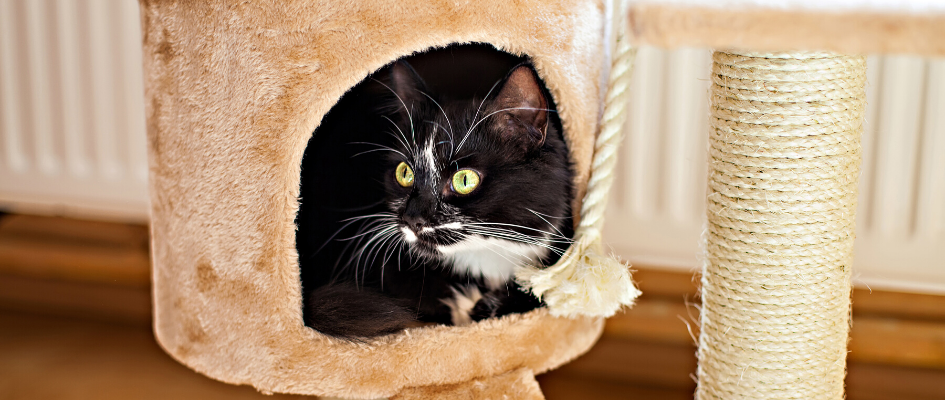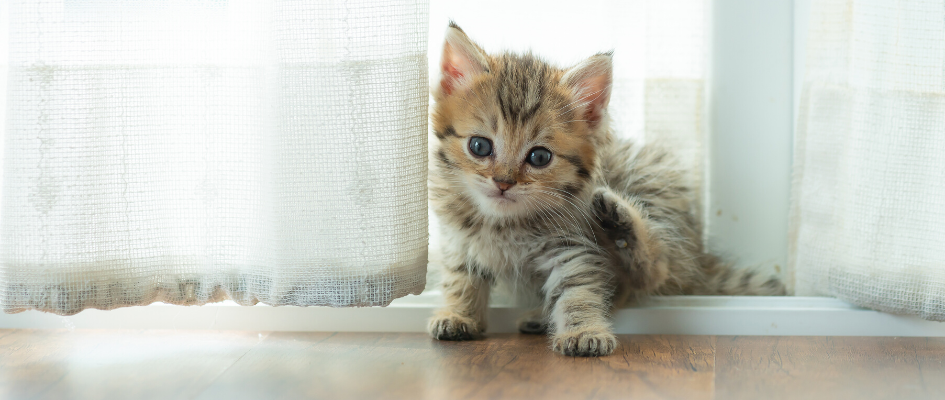Why is it important?
To grow and develop properly kittens need the right nutrition, socialisation, and preventative care. Follow our guidelines on how to look after your new kitten and give them the best start to life possible.
Vaccinations
In kittens, vaccinations are vital to prevent many severe diseases. They will usually need 2 vaccinations 3 weeks apart with the first one being at 8-9 weeks of age. If you get your kitten from a rescue centre it is likely that they are already fully vaccinated and should come with their vaccination record so your vet will be able to tell you if everything is up to date.
Microchip
We would recommend getting all cats microchipped as they often tend to wander and get lost. When you pick up your kitten if they are already microchipped you will need to change the details to be in your name. If they haven’t been microchipped already, you can do this alongside the vaccinations, or when they are being neutered.
Feeding
Kittens grow fast so they need lots of energy and minerals to reach their full potential. A balanced or “complete” kitten diet has everything your kitten will need. As a result, they should be on that until they are one year old to ensure they have done all their growing before going onto adult food. Read more advice on caring for your kitten through each development stage via Royal Canin.

Flea treatment
In young kittens a flea infestation is not just an annoying itch, it can be life threatening. The fleas suck their blood and kittens can quickly become anaemic. Both to prevent and treat this you can use a flea product from your vets, this will ensure it is safe and effective as many products cannot safely be used in young kittens. Shop bought flea products often are not meant for such small kittens, so it is usually best to go to your vet for advice.
Worm treatment
High worm burdens in kittens cause them to lose weight and get a ‘pot belly’. It is important you stay on top of worming treatment, especially in the first year of life because the immune system is not fully developed, and the kitten is more susceptible to worm infestations. Getting a product from your vet will ensure that the product is safe and effective.
Neutering
With the stray cat population ever increasing in the UK we would strongly recommend neutering your cat, boy or girl. In most cases, you can book in neutering for your kitten any time from 4 months of age. The benefits are not only that there are no accidental kittens but also that they are less likely to fight and pick up feline aids (FIV). Also, this may calm any behavioural spraying or other territorial behaviour.

Training
Litterbox training
Kittens learn very quickly and can be quickly litterbox trained in most cases. It is important that the litter tray is kept as clean as possible otherwise the kitten may refuse to use it. Also keep the litter consistent, otherwise this can lead to confusion and them stopping using the litter tray. Positive reinforcement is needed, so treat your kitten when they use it successfully. Cats are private creatures so having the litter tray slightly out the way, away from their food and water bowls, and possibly hidden or sheltered, will often make it more comfortable for them to use it.
Socialisation
When they are young, kittens explore the world with curiosity and not fear. This ‘socialisation window’ is when they learn what to be afraid of and what is safe. Generally, this is before 12 weeks of age. It is important that you expose your kitten to as much as possible in this time with positive experiences. In the same vein also reduce bad experiences, so if there is a dog that is not cat friendly do not try to introduce them.
Environment
You want your kitten’s home environment to feel safe and secure. Cats unlike dogs need alone time so plenty of hidey holes in cardboard boxes and beds in several places around the house is a must. When they feel scared, cats and kittens will try and take refuge higher up, if there is a place for you to put a cat bed on a higher surface then most kitten will appreciate that. Take care with children and make sure they give the kitten plenty of breaks. A scratching post is a must if you don’t want them to scratch your furniture! This is a natural behaviour so you must allow them a place where they can display that behaviour.
Insurance
Of course, we never expect anything to go wrong with our kittens but unfortunately accidents happen, and they do sometimes get sick. Please consider if you want to get your kitten insured if anything were to happen, many vets will give you 4 weeks free cover whilst you make up your mind in case anything goes wrong in the meantime.
What do I do if I want to know more?
To find out more, use this link to find details of your local branch, then just contact your local Goddard vet. Don’t forget, you can save money with your new kitten by signing up to our ProActive Pets preventative health plan.
